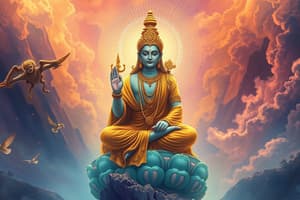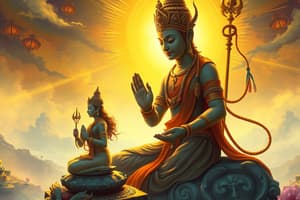Podcast
Questions and Answers
What does the term 'Dharma' signify in Hinduism?
What does the term 'Dharma' signify in Hinduism?
- Supernatural forces
- Religious texts
- Cultural traditions
- Individual's appropriate behavior or duty (correct)
Theravada Buddhism is known as the 'School of elder monks'.
Theravada Buddhism is known as the 'School of elder monks'.
True (A)
Hinduism is described as the oldest and most __________ of all religions.
Hinduism is described as the oldest and most __________ of all religions.
complex
Which sacred scripture is central to Theravada Buddhism?
Which sacred scripture is central to Theravada Buddhism?
Match the following terms with their descriptions:
Match the following terms with their descriptions:
What does Mahayana Buddhism aim to do?
What does Mahayana Buddhism aim to do?
In Shintoism, the sun god is referred to as Amaterasu O Mikami.
In Shintoism, the sun god is referred to as Amaterasu O Mikami.
What concept is considered key in Shintoism?
What concept is considered key in Shintoism?
In Mahayana Buddhism, Siddhartha is regarded as a benevolent ______ being.
In Mahayana Buddhism, Siddhartha is regarded as a benevolent ______ being.
Which of the following best describes the view of humans in Shintoism?
Which of the following best describes the view of humans in Shintoism?
Bodhisattvas in Mahayana Buddhism seek their own enlightenment before helping others.
Bodhisattvas in Mahayana Buddhism seek their own enlightenment before helping others.
What should be maintained according to Shintoism?
What should be maintained according to Shintoism?
Match the following key concepts with their respective religions:
Match the following key concepts with their respective religions:
Which of the following texts is NOT part of the Buddhist canon?
Which of the following texts is NOT part of the Buddhist canon?
The concept of Atman in Hinduism describes an eternal soul that is reborn.
The concept of Atman in Hinduism describes an eternal soul that is reborn.
What are the Four Noble Truths in Buddhism?
What are the Four Noble Truths in Buddhism?
Hinduism offers many paths to _____.
Hinduism offers many paths to _____.
Match the following Buddhist terms with their meanings:
Match the following Buddhist terms with their meanings:
Which of the following is one of the Three Jewels in Buddhism?
Which of the following is one of the Three Jewels in Buddhism?
The Trimurti in Hinduism consists of Brahma, Vishnu, and Yama.
The Trimurti in Hinduism consists of Brahma, Vishnu, and Yama.
What is the purpose of right effort in the Eightfold Path?
What is the purpose of right effort in the Eightfold Path?
The _____ is considered to be a guiding principle in Confucianism, emphasizing human relationships.
The _____ is considered to be a guiding principle in Confucianism, emphasizing human relationships.
Which festival is known as India’s biggest and most important holiday?
Which festival is known as India’s biggest and most important holiday?
According to Daoism, Wu Wei encourages taking decisive action at all times.
According to Daoism, Wu Wei encourages taking decisive action at all times.
What does the term 'anatman' signify in Buddhism?
What does the term 'anatman' signify in Buddhism?
The path to the cessation of suffering in Buddhism is represented by the _____ Path.
The path to the cessation of suffering in Buddhism is represented by the _____ Path.
Match the following beliefs with their corresponding religious tradition:
Match the following beliefs with their corresponding religious tradition:
Flashcards
Theravada Buddhism
Theravada Buddhism
A school of Buddhism that draws on the teachings of the oldest Buddhist texts, known as the Pali Canon, and emphasizes meeting basic human needs and solving humankind's spiritual problems.
Hinduism's Origin
Hinduism's Origin
Hinduism is one of the world's oldest and most complex religions, originally known as "Arya Dharma" or the "Aryan Way".
Hinduism's Dharma
Hinduism's Dharma
In Hinduism, Dharma represents an individual's appropriate behavior or duty to be fulfilled.
Sacred Hindu Scriptures
Sacred Hindu Scriptures
Signup and view all the flashcards
"Shruti" and "Smriti"
"Shruti" and "Smriti"
Signup and view all the flashcards
Mahayana Buddhism
Mahayana Buddhism
Signup and view all the flashcards
Bodhisattvas
Bodhisattvas
Signup and view all the flashcards
Shintoism
Shintoism
Signup and view all the flashcards
Amaterasu O Mikami
Amaterasu O Mikami
Signup and view all the flashcards
Shinto Purity
Shinto Purity
Signup and view all the flashcards
Death in Shintoism
Death in Shintoism
Signup and view all the flashcards
Yu Wei
Yu Wei
Signup and view all the flashcards
Contrast between Yu Wei and Letting Nature Run its Course
Contrast between Yu Wei and Letting Nature Run its Course
Signup and view all the flashcards
What are the Vedas?
What are the Vedas?
Signup and view all the flashcards
What are the Upanishads?
What are the Upanishads?
Signup and view all the flashcards
What is the meaning of Smriti?
What is the meaning of Smriti?
Signup and view all the flashcards
What is the Ramayana?
What is the Ramayana?
Signup and view all the flashcards
What is the Mahabharata?
What is the Mahabharata?
Signup and view all the flashcards
What is the Trimurti?
What is the Trimurti?
Signup and view all the flashcards
How can someone achieve Moksha?
How can someone achieve Moksha?
Signup and view all the flashcards
What is Samsara?
What is Samsara?
Signup and view all the flashcards
What is Karma?
What is Karma?
Signup and view all the flashcards
What is Diwali?
What is Diwali?
Signup and view all the flashcards
What is the Triratna?
What is the Triratna?
Signup and view all the flashcards
What are the Four Noble Truths?
What are the Four Noble Truths?
Signup and view all the flashcards
What is Dukkha?
What is Dukkha?
Signup and view all the flashcards
What is Samodaya?
What is Samodaya?
Signup and view all the flashcards
What is Nirodha?
What is Nirodha?
Signup and view all the flashcards
What is Magga?
What is Magga?
Signup and view all the flashcards
What is the Eightfold Path?
What is the Eightfold Path?
Signup and view all the flashcards
Study Notes
Dharmic Religions
- Hinduism is the oldest and most complex religion.
- The term "Hindu" comes from the Persian word "hindu", meaning river.
- It was originally known as "Arya Dharma" or the "Aryan Way".
- Dharma encompasses appropriate behavior, duty, customs, and laws.
- Sacred scriptures are passed down through generations using music, recitation, dance, and drama.
- Two types of scriptures exist: Shruti ("heard") and Smriti ("remembered").
- Shruti includes the Vedas ("knowledge" or "sacred lore") and Upanishads ("sitting down nearby").
- Smriti includes the Ramayana and Mahabharata.
- Hinduism offers multiple paths to salvation, such as Bhakti Yoga.
- The Trimurti consists of Brahma (creator), Vishnu (preserver), and Shiva (destroyer).
- Routes to Moksha (liberation) involve the concept of Samsara (cycle of rebirth).
- Actions have consequences (karma) that affect future lives.
- An eternal soul (Atman) is reborn many times, reflecting moral laws.
- Key festivals include Diwali (Festival of Lights), among others.
Theravada Buddhism
- A practical religion that originated in East Asia.
- Emphasizes basic human needs and spiritual problems.
- It rejects reliance on supernatural forces.
- Known as the Southern School, based on the teachings from the Pali Canon.
- Siddhartha Gautama, left his family, wealth, and social status, seeking enlightenment.
- Key scriptures include the Tripitaka (three baskets): Sutta Pitaka (teachings), Vinaya Pitaka (disciplinary rules), and Abhidhamma Pitaka (psychology).
- Parinirvana refers to Siddhartha's death.
- The First Buddhist Council convened to record and recite teachings (Dhamma/Dharma).
Confucianism
- A philosophy, aiming to revitalize the Zhou dynasty's religious practices.
- Primarily focuses on human relations.
- Key doctrines emphasize social harmony, moral responsibility, and virtuous behaviors to achieve societal order.
Daoism
- Founded by Lao Tzu, author of the Dao De Jing/Book of the Way and its Power.
- Primarily a system of philosophy and ways of life, rather than a structured religion.
- Central idea is Wu Wei (non-action) or doing without doing, aligning with the natural order, adapting to circumstances without striving.
Shintoism
- A Japanese religion focused on worshiping Kami (spirits or deities).
- Viewed as less of a religion, more a way of life and practices.
- Amaterasu Omikami is their sun goddess.
- Values purification and harmony with nature.
General Impurities
- Blood is considered impure (menstruating women, childbirth).
- Death is viewed as an impure state.
- Rituals of purification are often associated with these situations, particularly in some cultural contexts.
Studying That Suits You
Use AI to generate personalized quizzes and flashcards to suit your learning preferences.




